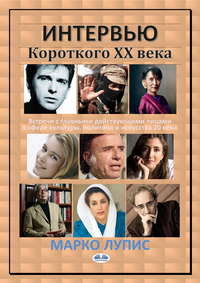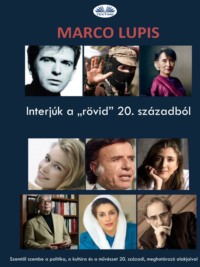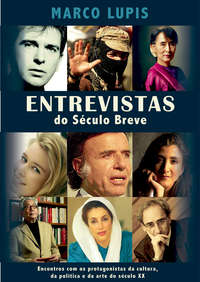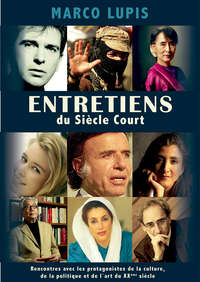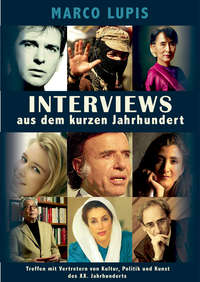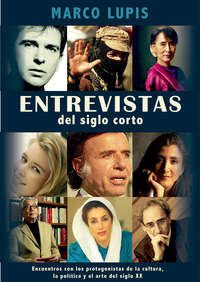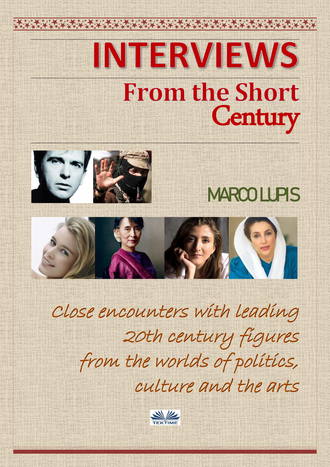
Interviews From The Short Century
Fighting corruption is at the forefront of her campaign, closely followed by the civil war. âThe State should have no qualms about negotiating with the left-wing guerrillas,â she concludes, âunlike the right-wing paramilitary group the AUC, which is responsible for most of the murders that take place in Colombia.â
So how does she live with fear and threats on a daily basis?
â I think, in a funny kind of way, you get used to it. Not that you should have to. The other day,â she concludes calmly, âI received a photo of a dismembered child in the post. Underneath it was written: âSenator, we have already hired a hit man to take care of you. Weâre reserving special treatment for your sonâ¦ââ.
6
Aung San Suu Kyi
Winner of the 1991 Nobel Peace Prize
Free from fear
Following considerable pressure from the United Nations, Aung San Suu Kyi was released on 6 May 2002. It made headlines around the world, but her freedom was short-lived. On 30 May 2003, a group of soldiers opened fire on her convoy, killing many of her supporters. She survived thanks to the quick reflexes of her driver Ko Kyaw Soe Lin, but she was again put under house arrest.
The day after her release in May 2002, I used some of my contacts within the Burmese opposition to arrange an interview with Ms Suu Kyi vie email.
*****
At ten oâclock yesterday morning, the guards stationed outside the home of Aung San Suu Kyi, the leader of the Burmese opposition National League for Democracy (NLD), quietly returned to their barracks. And so it was, in a surprise move, that the military junta in Rangoon lifted the restrictions it had placed on the movement of the pacifist leader known simply in her homeland as âThe Ladyâ, a woman who won the Nobel Peace Prize in 1991 and had been under house arrest since 20 July 1989.
So ever since ten oâclock yesterday morning, after a period of nearly thirteen years, Aung San Suu Kyi has been free to leave her lakeside house, speak to whomever she wants, be politically active and see her children.
But is this really the end of the period of isolation for the Burmese Pasionaria? The exiled opposition still do not believe the grand declarations from the military junta, which said it was freeing Ms Suu Kyi unconditionally.
They would rather wait and see. And pray. Indeed, since yesterday, the Burmese diaspora have already held prayer demonstrations in Buddhist temples in Thailand and other parts of eastern Asia.
As for The Lady herself, she too has wasted little time. She was immediately driven to the headquarters of the NLD, which had won a landslide victory (nearly sixty per cent of the vote) in the 1990 elections while the governing National Unity Party (NUP) secured just ten of the four hundred and eighty-five seats. The military government annulled the results, outlawed the opposition (imprisoning or exiling its leaders) and violently suppressed any protests. Parliament was never convened.
The Italian edition of your autobiography is called Libera dalla paura [Free From Fear]. Is that how you feel now?
Yes, for the first time in more than a decade, I feel free. Physically free. Free to go about my business and think, above all. As I explain in my book, however, Iâve felt âfree from fearâ for many years. Ever since I realised that the tyranny here in my country could harm humiliate or even kill us, but they couldn't scare us anymore.
You've only just been released, but youâve said today that there are no conditions on your freedom and that the governing military junta has even authorised you to leave the country. Do you really believe that?
In a press release issued yesterday evening, a spokesperson for the junta spoke of âa new chapter for the people of Myanmar and the international communityâ. Hundreds of political prisoners have been released over the last few months, and the military has assured me that they will continue to set free those who, in their words, âdo not present a danger to societyâ. Everybody here wants to believe, wants to hope that this really is a sign of change. A sign that we are back on the path towards democracy, which was so suddenly and violently cut off in the coup of 1990. It is a path that the Burmese people have never forgotten.
Now that you have been freed, are you not scared of being expelled and distanced from your supporters?
Let me be clear: I will not leave. I am Burmese, and I turned down British citizenship precisely because I didnât want to give the regime any excuses. Iâm not afraid, and that gives me strength. But the people are hungry, which frightens them, and that makes them weak.
You have strongly denounced, on several occasions, the military's attempts to intimidate anyone who sympathises with the NLD. Is that still going on today?
According to the figures we have, in 2001 alone the army arrested more than one thousand opposition activists under orders from SLORC [State Law and Order Restoration Council] generals. Many others have been forced to resign from the League [NLD] after being submitted to intimidation, threats and other wholly unjustified and unlawful pressures. Their meticulous method is always the same: unleash units of government officials who go from door to door across the entire country asking citizens to leave the League. Those who refuse are blackmailed with the threat of losing their jobs, or worse. Many branches of the party have closed down, and the military checks the number of people who have quit on a daily basis. This shows how afraid they are of the League. Every one of us hopes that all this is now really over.
Did the military's decision to release you take you by surprise, or was it something they had been planning for a while because they were conscious of their global reputation?
Since 1995, Myanmar has gradually become less isolated. The University of Yangon has been reopened, and maybe there has been a slight improvement in living standards. But the daily reality remains violence, unlawfulness and oppression against dissidents, ethnic minorities in search of autonomy (Shan, Bwe, Karen) and, more generally, the majority of the Burmese people. Problems are mounting up for the military, both domestically and internationally. In the meantime, they continue to traffic in drugs until they can find another, equally lucrative, source of income. But what will that be? Myanmar is essentially a gigantic safe to which only the army knows the combination. It wonât be easy to convince the generals to share this wealth with the other fifty million Burmese.
At this stage, what are your terms for entering into dialogue?
We wonât accept anything - there has been talk, for example, of the generals calling an election - until the parliament that was elected in 1990 has been restored. My country is still paralysed with fear. There cannot be genuine peace until there is a genuine commitment that honours all those who have fought for a free and independent Myanmar, but we are well aware that ongoing peace and reconciliation requires ever greater vigilance, courage and the ability to resist actively but without resorting to violence.
What can the European Union do to help the people of Myanmar?
Keep applying pressure, because the generals have to know that the world is watching and will not allow them to commit more heinous crimes with impunity.
*****
Aung San Suu Kyi was finally released for good on 13 November 2010. In 2012, she won a seat in the Burmese parliament, and on June 16 of the same year, she was finally able to receive her Nobel Peace Prize in person. Finally authorised to travel abroad, she went to the UK to visit the son she had not seen for several years.
On 6 April 2016, she became State Counsellor (equivalent to Prime Minister) of Myanmar.
While it is true that Myanmar is not yet a totally free country, and its dictatorial past weighs on both its history and its future, there is no doubt that freedom and democracy are now more than just pipe dreams in the Land of A Thousand Pagodas.
7
LucÃa Pinochet
Death, torture and disappearance
Santiago, March 1999 .
â Pinochet? Chileans see him as a cancer. A hidden and painful illness. You know itâs there, but you're afraid to talk about it...to even say its name. So you end up pretending it doesnât exist. Maybe you think that by ignoring it, it will just go away without you having to confront it.â The waitress at Café El Biógrafo , a popular hangout for poets and students in the picturesque bohemian Santiago barrio of Bellavista, known for its colourful houses, couldn't have been much more than twenty years old. She may not even have been born when General Augusto Pinochet Ugarte, the â Senador vitalicio â [Senator-for-life] as he is known here, was either giving orders that would see his opponents âkilled, tortured and forcibly disappearedâ - as the families of the more than thirty thousand desaparecidos claim - or ruling with an iron fist to ensure that Chile was free from the threat of communism - as his admirers insist. And yet she is keen to talk to me about Pinochet, and she has some forthright views: âItâs all about Pinochet here. Whether you're a fan of his or not, you can't deny that he is present in every part of Chilean life. He's part of our politics, clearly. He lives large in everyone's memories, in my parentsâ stories, in teachersâ lessons. Heâs in novels, non-fiction books, the cinema. That's right, in Chile even films are either for or against Pinochet. And yet somehow we continue to pretend that he isnât there...â
This stubborn old man, who faced up to the British justice system âwith the dignity of a soldierâ, this âpoor old guyâ (as whispered into my ear by the concierge at the CÃrculo de la Prensa , where during the shadowy years of the military dictatorship, people loyal to the General would come to âpick upâ pesky journalists right in front of the Palacio de La Moneda, where Salvador Allende died in the midst of the coup) had become a lumbering giant whose presence was felt in every corner of every street of every quarter of Santiago, a city that seemed to me uncertain and inward-looking
He is the living memory of this country - a colossal, ubiquitous memory that embarrasses those who supported him and irritates those who opposed him. A vast, sprawling memory that clings to people's lives, hopes and fears, to Chile's past and to its future.
In October 1998, having retired as Commander-in-Chief of the Chilean army and been appointed Senator-for-life, Pinochet was arrested while in London for medical treatment and placed under house arrest. First at the clinic where he had just undergone back surgery, and then in a rented house.
The international arrest warrant had been signed by a Spanish judge, Baltasar Garzón, for crimes against humanity. The charges included nearly a hundred counts of torture of Spanish citizens and count of conspiracy to commit torture. The UK had only recently signed the United Nations Convention against Torture, meaning that all the charges related to events that occurred during the final fourteen months of his rule.
The Chilean government immediately opposed his arrest, extradition and trial. Thus began a hard-fought, sixteen-month battle in the House of Lords, then the highest court in the UK. Pinochet claimed diplomatic immunity as a former head of state, but the Lords refused in light of the severity of the charges and authorised the extradition, albeit with several restrictions. However, shortly afterwards, a second ruling by the Lords enabled Pinochet to avoid extradition on health grounds (he was eighty-two years old at the time of his arrest), for âhumanitarianâ reasons. Following medical assessments, the British Home Secretary Jack Straw authorised Pinochet to return to Chile in March 2000, nearly two years after he was put under house arrest.
It was at the end of March 1999, in the midst of this complex international legal battle, that I went to Santiago to monitor the situation for the daily Il Tempo and to interview Pinochetâs eldest daughter, LucÃa. The House of Lords had just rejected Pinochetâs claim for immunity, and the plane that the generalâs family and supporters had hoped would bring him home to Chile returned without him.
The reaction on the streets of Santiago was immediate. On March 24, the Chilean capital had awaited the ruling with bated breath. The city may not have been in lockdown, but there was a discrete Carabineros - military police - presence at potential flashpoints: the presidential seat at La Moneda, the British and Spanish embassies, and the headquarters of pro- and anti-Pinochet organisations. There was blanket media coverage, enabling Chileans to follow events minute by minute. With live satellite links to London, Madrid and various locations in Santiago starting at seven in the morning and lasting all day, it felt like a truly historical event. At around midday local time, less than an hour after the Lords had issued their ruling, two afternoon dailies were published in special edition. The headline of one of them put it very neatly: âPinochet loses but winsâ.
In the morning, the residents of Santiago had crowded round televisions in public places, from McDonald's to the smallest of bars, to follow all the crucial developments. Angry customers in one large city-centre store beseeched the manager to tune the TV into the live feed from London.
The situation had remained broadly calm until the late afternoon, when the first signs of tension began to surface. At four oâclock local time, there were the first clashes between students and the police in the city centre, at the crossroads between La Alameda [2] and Miraflores, with a dozen or so people injured and around fifty students arrested.
There were plenty of appeals for calm, mainly from members of the government. The inflammatory remarks from General Fernando Rojas Vender (the pilot who bombed La Moneda during the 1973 coup dâétat and the commander of the Chilean Air Force), who on the previous Tuesday had publicly stated that the climate in Chile was becoming âsimilar to how it was in 1973â had been condemned in the strongest terms by the government, which forced Rojas into a public retraction.
Now all eyes were on Mr Straw. The propaganda machine of Pinochetâs supporters was ready to roll, aiming to discredit the British Home Secretary whom they accused of publicly and forcefully endorsing the Chilean left on a trip to the country in 1966. Some people claimed they could prove that the young Mr Straw had held an informal meeting with the Chilean president at the time, Salvador Allende, who had invited him for tea.
As you can imagine, there were plenty of things I wanted to discuss as I made my way to LucÃa Pinochet's house.
*****
Inés LucÃa Pinochet Hiriart is Augusto's oldest daughter. She is an attractive woman who carries her age well and her tainted surname even better. The only reason she is not with her siblings in London, by her father's side, is that she has her leg in plaster. So she has been forced to stay in Santiago with the unenviable task of representing, and above all defending, the Senator-for-life.
We meet in her beautiful home in a well-to-do part of the city, and with her windows open we can hear demonstrators chanting pro-Pinochet slogans. With her three sons - Hernán, Francisco and Rodrigo - by her side, she speaks to me for nearly an hour, during which we cover the current situation with her father and, inevitably, the future of Chile as a whole.
What do you make of the âhumanitarianâ ruling that has just been given in your fatherâs case?
I would rather my father had been granted the full immunity he was entitled to as the former head of a sovereign state. Instead of a criminal trial, it has become a political debate about alleged torture, genocide and other crimes, bowing to pressure from socialists and people who claim they want to defend human rights.
Have you spoken to your father? How has he taken it?
My father is not happy about it. They had warned him about the possibility of a âhumanitarianâ ruling. And he's certainly not best pleased about Jack Straw handling the whole thing.
This is the man who people here claim took tea with Salvador Allende on a visit to Chile in 1966?
Exactly. Weâve known this for years. When they arrested my father in London, Straw said he had achieved a lifetimeâs ambition. Go figure.
So this has now shifted from being a legal case to a humanitarian one...
It's always been all about politics! It was nonsense ever talking about a trial; the only things on the agenda in London should have been presidential immunity and territorial sovereignty, not torture.
Nevertheless, many commentators have observed that this is an historical ruling that sets an important legal precedent. Do you share that view?
Of course, because it's the first time we have seen a situation like this. Remember, international conventions have been in place for many years, but there has never been a trial nor a court of justice for judging and possibly punishing human rights violations. My father is being used as a guinea pig!
What is your father's state of health?
You must remember he is eighty-three years old and has just gone through major surgery. He's recovering slowly, but he's diabetic and he needs daily treatment and check-ups.
Do you fear for his health if he is extradited?
Yes, it could really set him back. And Iâm particularly worried about my mother's health. She hasn't felt up to following the most tense moments of the case. When she heard the Lordsâ sentence on TV, she was taken ill and the doctors had to give her several injections to reduce her blood pressure.
Do you feel let down by the English justice system?
No, because I don't think this is about the English as a whole. It's more about the people currently in power in the UK. And as we know, they are lefties.
Do you think there are people in England who are sympathetic to your cause?
Lots of English people are behind us. I discovered that when I was over there recently. Lots of people came up to me to show their solidarity. And it's not in their interests, because my fatherâs case is costing the British taxpayer a lot of money.
Do you think President Frei has acted strongly enough?
I think he could have been a little more forceful, but he's done enough and I thank him for that. I definitely would have liked to see him ensure that the international community treats our country with the respect it deserves. It is unacceptable that a former head of state, senator and commander-in-chief is being detained abroad.
How do you plan to mark the occasion if your father returns to Chile?
With the family. Having him come home will be the biggest celebration of all.
On his return, will he go straight back to the Senate or, as some people here are suggesting, will he allow the dust to settle and first spend some time in one of his many houses, like in Bucalemu, El Melocotón or Iquique?
Look, I honestly donât know why people over here are getting so worked up about it. The last thing my father wants is to cause problems. To harm or create division in Chilean society. All he wants is for Chile to finally be able to move towards lasting peace and national reconciliation, so it can continue along the difficult path to economic growth. Thatâs why he may not make an immediate return to the Senate if he thinks it will help.
Have you spoken to him about it?
No, it's just what I think. What he has said to me though, time and again, is that he desperately wants to come back without causing any problems. My father wants to be a force for unity, not division.
Do you think your father is ready to hand himself over to the Chilean authorities?
Iâm utterly convinced that he's happy to answer any questions they may have for him. That doesnât mean he feels guilty; he knows he's not guilty. But, as I said, he has always had, and continues to have, great respect for the Chilean justice system.
Do you agree with your brother Marco Antonioâs assertion that there were abuses of power during your fatherâs period of rule?
My brother and I sometimes phrase things differently, but Iâve always maintained that there were occasional abuses. Remember, though, that this was a terribly difficult period in Chileâs tumultuous history - out-and-out war, an underground struggle between two sides. Thatâs why both sides occasionally overstepped the mark.
Do you think your father should ask for forgiveness?
My father does not feel guilty. If you think you're innocent, what are you asking for forgiveness for?
Do you agree with the recent comments of General Fernando Rojas Vender, who said that the climate in Chile was becoming similar to the period of office of the Popular Unity alliance?
General Rojas was only telling it how it is. The country is being torn apart and risks falling headlong into an uncertain and tragic future.
What do you make of the armed forcesâ attitude to your fatherâs detention? There's talk of itchy trigger fingers.
If I were a military person, and a former commander-in-chief of my country had been arrested abroad, I would be outraged. I would see it as an attack on my country's sovereignty and a lack of respect towards the army. In fact, I think the military has shown remarkable restraint so far. Iâm not sure I would have done in their position.


